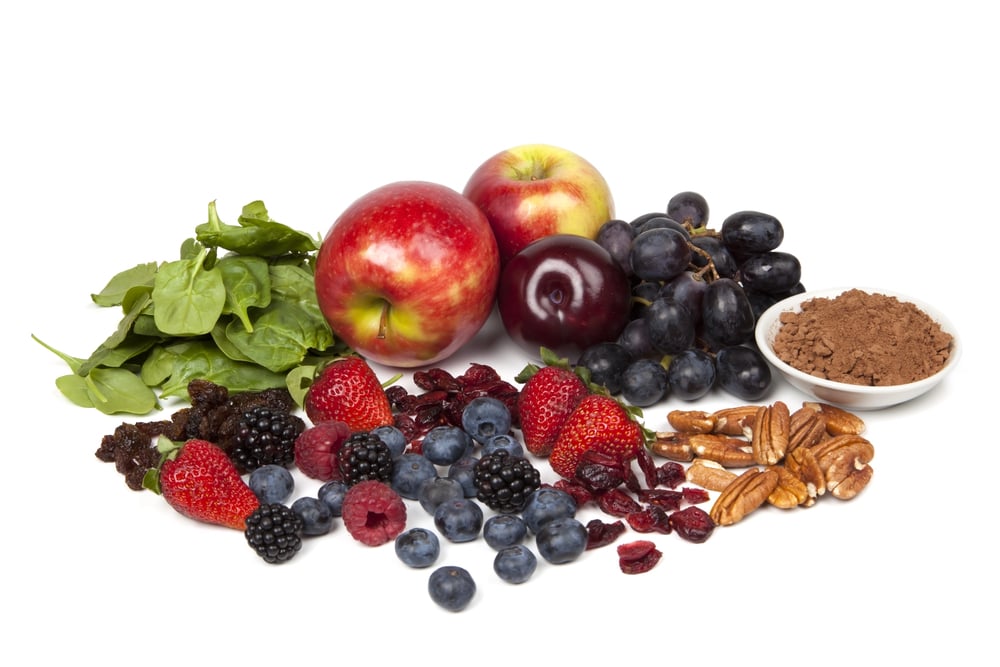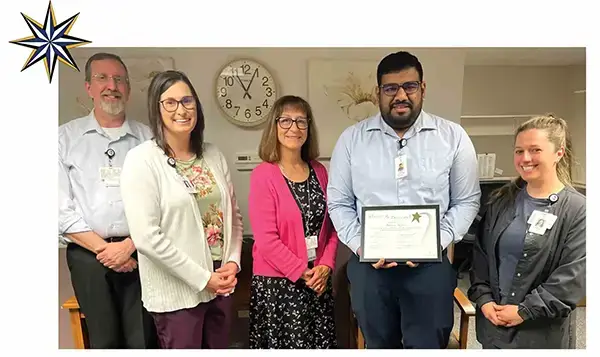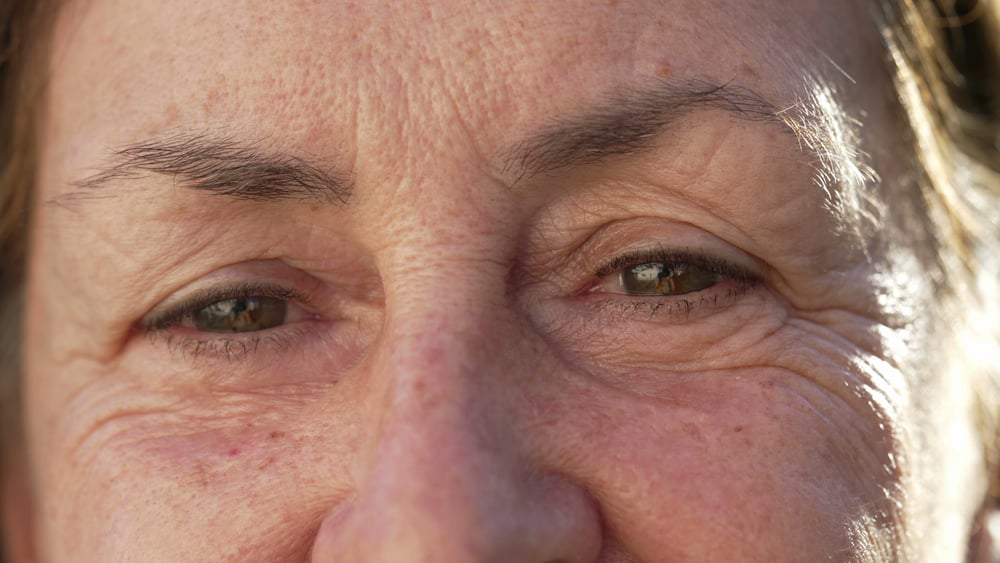It’s easy to take clear vision for granted—until things start to look a little blurry or dim. For many adults, those subtle changes are the first signs of cataracts, a common condition that can gradually cloud the lens of your eye and make everyday activities harder.
The good news? While cataracts are a natural part of aging for most people, healthy habits can play a powerful role in slowing their progression and protecting your eyesight for years to come.
Let’s take a closer look at what causes cataracts, what you can do to lower your risk, and how Douglas Bull, MD, an ophthalmologist at Reedsburg Area Medical Center, can help you maintain clear, healthy vision.
What Happens When Cataracts Form
Inside your eye, a clear lens focuses light onto the retina, like a camera lens. Over time, proteins in the lens can clump together, forming cataracts—cloudy areas that scatter light and cause blurry vision, faded colors, glare, and trouble seeing at night. Cataracts mainly result from aging and risk factors such as genetics, diabetes, and prolonged UV exposure. Oxidative stress—an imbalance between free radicals and antioxidants—accelerates this process and is increased by UV exposure, smoking, poor nutrition, and certain health conditions.
While aging is unavoidable, you can reduce other risks to help protect your eyes from cataracts.
Why Age and Genetics Matter—But Don’t Tell the Whole Story
Age is the number-one risk factor for cataracts. By the time most people reach 80, more than half have developed them or had cataract surgery, according to the American Academy of Ophthalmology.
Genetics also plays a part. If your parents or siblings developed cataracts, your risk may be higher. Certain genetic conditions can even cause cataracts earlier in life.
But here’s some encouraging news for you: your daily choices can influence how soon and how quickly cataracts develop. By focusing on nutrition, sun protection, and regular eye care, you can help delay their onset and preserve your vision longer.
Eat for Eye Health: The Power of Good Nutrition

Your eyes are remarkably responsive to what you eat. A balanced diet filled with vitamins, minerals, and antioxidants can help protect your lens from oxidative damage and maintain the health of your entire visual system.
Studies show that people with diets rich in antioxidants—especially vitamins C and E, lutein, and zeaxanthin—have a lower risk of developing cataracts. These nutrients work like an internal sunscreen for your eyes, neutralizing free radicals before they can damage lens proteins.
Try adding these eye-friendly foods to your meals:
- Leafy greens like spinach, kale, and collard greens – packed with lutein and zeaxanthin.
- Citrus fruits and bell peppers – excellent sources of vitamin C.
- Nuts and seeds, including almonds and sunflower seeds – rich in vitamin E.
- Egg yolks – contain both lutein and zeaxanthin in an easily absorbed form.
- Colorful fruits and vegetables like corn, red grapes, and carrots – full of antioxidants that support eye health.
A good rule of thumb? Fill your plate with color. The more variety of fruits and vegetables you eat, the more nutrients your eyes (and your whole body) will benefit from.
Protecting Your Eyes from UV Damage
Just like your skin, your eyes are vulnerable to the sun’s ultraviolet (UV) rays. Long-term UV exposure accelerates the breakdown of lens proteins, increasing your risk for cataracts and other eye conditions.
Think of sunlight as a slow, invisible stressor. Each unprotected exposure adds up over time, leading to cumulative damage that your eyes can’t repair. The solution is simple: wear sunglasses every time you’re outdoors, even on cloudy or winter days.
What to look for in sunglasses:
- 100% UV protection: Blocks 99–100% of both UVA and UVB rays.
- Wraparound frames: Shield your eyes from sunlight coming in from the sides.
- Visible light filtering: Reduces glare and harsh blue light for added comfort.
Keep sunglasses handy—in your car, purse, or by the door—so it’s easy to make this a daily habit. Wide-brimmed hats can add an extra layer of protection too.
Small Habits, Big Impact: Lifestyle Choices That Matter
Beyond nutrition and sun safety, your everyday habits can directly influence your risk of developing cataracts. Two of the biggest factors? Smoking and alcohol consumption.
The impact of smoking
Smoking floods your body with toxins that increase oxidative stress and reduce the antioxidants your eyes need to stay healthy. This accelerates lens damage and can cause cataracts to appear earlier in life. The encouraging news is that the benefits of quitting begin almost immediately—and your cataract risk starts to decline within a few years.
The role of alcohol
Excessive alcohol intake can also harm your lens. Heavy drinking contributes to dehydration, inflammation, and nutrient loss—all of which can impact your eye health. If you drink, try to limit it to one drink per day or less.
Managing medical conditions
Certain health conditions, particularly diabetes, significantly increase cataract risk. High blood sugar can change the chemical balance inside your lens, making it cloudy more quickly. Keeping your blood sugar, blood pressure, and cholesterol within healthy ranges is one of the best ways to protect your eyes over the long term.
Healthy living isn’t just about feeling good today—it’s about keeping your vision clear tomorrow.
Why Regular Eye Exams Are Non-Negotiable
Even if you have perfect vision, routine eye exams are one of the most important things you can do for your long-term eye health. Cataracts develop slowly, and early changes in your lens can go unnoticed until your vision is already affected.
During a comprehensive eye exam, your ophthalmologist can detect early lens clouding and track its progression over time. These visits also give you the opportunity to discuss lifestyle adjustments, prescription changes, or preventive treatments.
How often should you schedule exams?
- Ages 40–64: Every two to four years
- Ages 65 and older: Every one to two years
- Earlier or more frequent exams may be recommended if you have diabetes, a family history of cataracts, or other risk factors.
When you come in for your appointment, be ready to discuss any changes in your vision—like glare, halos around lights, or trouble seeing at night. Bring your current glasses or contacts, and write down any questions you’d like to ask your eye doctor.
These visits are your opportunity to take charge of your vision health before small problems become major obstacles.
Meet Dr. Douglas Bull: Your Partner in Eye Health
At Reedsburg Area Medical Center, we’re fortunate to have an eye specialist who can not only provide advanced treatment but can also give you advice to help you prevent cataracts. Dr. Douglas Bull, a board-certified ophthalmologist, is known throughout the Reedsburg area for his compassionate approach and advanced expertise in cataract prevention and treatment. Dr. Bull is committed to providing up-to-date guidance about eye health and helping patients understand all risk factors involved.
Dr. Bull understands that every patient’s situation is unique. Whether you’re hoping to prevent cataracts, manage early signs, or explore surgical options, he takes the time to listen, explain, and develop a personalized plan that fits your lifestyle and goals.
With the full support of the RAMC Ophthalmology team, you’ll receive care that combines medical excellence with a personal touch—close to home, right here in Reedsburg.
Improved Vision Starts with Healthy Choices
Cataracts may be a natural part of aging, but they don’t have to define your future. The choices you make today—what you eat, how you protect your eyes, and how often you schedule checkups—can make all the difference.
Here’s a quick recap of what helps keep your vision strong:
- Eat a colorful, antioxidant-rich diet.
- Wear sunglasses every time you’re outdoors.
- Quit smoking and limit alcohol.
- Manage health conditions like diabetes.
- Schedule regular eye exams.
And when you need expert guidance, Dr. Bull and the team at Reedsburg Area Medical Center are here for you. Together, we’ll help you see the world clearly for years to come.
To schedule an appointment with Dr. Douglas Bull, call (608) 768-3900 or visit our Ophthalmology Services page. Our team will be happy to help you take the next step toward a healthier vision.
References:
https://www.mayoclinic.org/diseases-conditions/cataracts/symptoms-causes/syc-20353790
https://my.clevelandclinic.org/health/diseases/8589-cataracts-age-related







